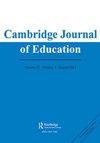面向实践理解STEAM教育中的学生自我评估:模范教育者如何利用自我评估
IF 1.5
3区 教育学
Q2 EDUCATION & EDUCATIONAL RESEARCH
引用次数: 0
摘要
摘要尽管研究人员已经开始发展评估理论,以支持科学、技术、工程、艺术和数学(STEAM)教育中的综合学习,但学生自我评估(SSA)的作用——课堂评估的核心方面——却没有得到充分的研究。本研究的目的是初步了解STEAM教育工作者如何在综合学习中激发SSA。本研究采用了一种深入的定性方法,利用来自14名有意选择的STEAM教师的访谈和手工艺品数据,确定了七种类型的SSA活动:(a)学习的自我记录;(b) 反思;(c) 使元认知过程显性化;(d) 原型测试和修订;(e) 目标设定;(f) 自检;以及(g)互动SSA。结合工程设计过程(通常用于整合STEAM教育中的学科),研究结果提供了对STEAM教育工作者如何利用SSA的细微理解,从而推进了综合教育中的评估理论和实践。本文章由计算机程序翻译,如有差异,请以英文原文为准。
Toward a Praxis-Oriented Understanding of Student Self-Assessment in STEAM Education: How Exemplary Educators Leverage Self-Assessment
ABSTRACT While researchers have begun to develop theories of assessment to support integrated learning within Science, Technology, Engineering, Arts and Mathematics (STEAM) education, the role of student self-assessment (SSA) – a core aspect of classroom assessment – has been understudied. The purpose of this research was to develop an initial praxis-oriented understanding of how exemplary STEAM educators provoke SSA in integrated learning. Through an in-depth qualitative methodology drawing on interview and artefact data from 14 purposefully selected exemplary STEAM teachers, this study identified seven types of SSA activities: (a) self-documentation of learning; (b) reflection; (c) making metacognitive processes explicit; (d) prototype testing and revision; (e) goal setting; (f) self-testing; and (g) interactional SSA. Superimposed on the engineering design process, a process commonly leveraged to integrate disciplines in STEAM education, results provide a nuanced understanding of how exemplary STEAM educators leverage SSA, advancing assessment theory and practice in integrated education.
求助全文
通过发布文献求助,成功后即可免费获取论文全文。
去求助
来源期刊

Cambridge Journal of Education
EDUCATION & EDUCATIONAL RESEARCH-
CiteScore
5.30
自引率
4.30%
发文量
35
期刊介绍:
Cambridge Journal of Education publishes original refereed articles on all aspects of education, with a particular emphasis on work that contributes to a shared understanding amongst academic researchers, theorists, practising teachers, policy-makers and educational administrators. The journal also welcomes the submission of systematic review articles that summarise and offer new insights into specific areas of educational concern. With a wide international readership, Cambridge Journal of Education publishes contributions drawn from different educational systems and cultures enabling continued in-depth discussion of global educational theory, policy and practice. The journal’s Special Issue programme encourages and stimulates focused discussion and engagement with significant themes and responses to topics raised by readers and contributors. Cambridge Journal of Education welcomes proposals for future editions.
 求助内容:
求助内容: 应助结果提醒方式:
应助结果提醒方式:


